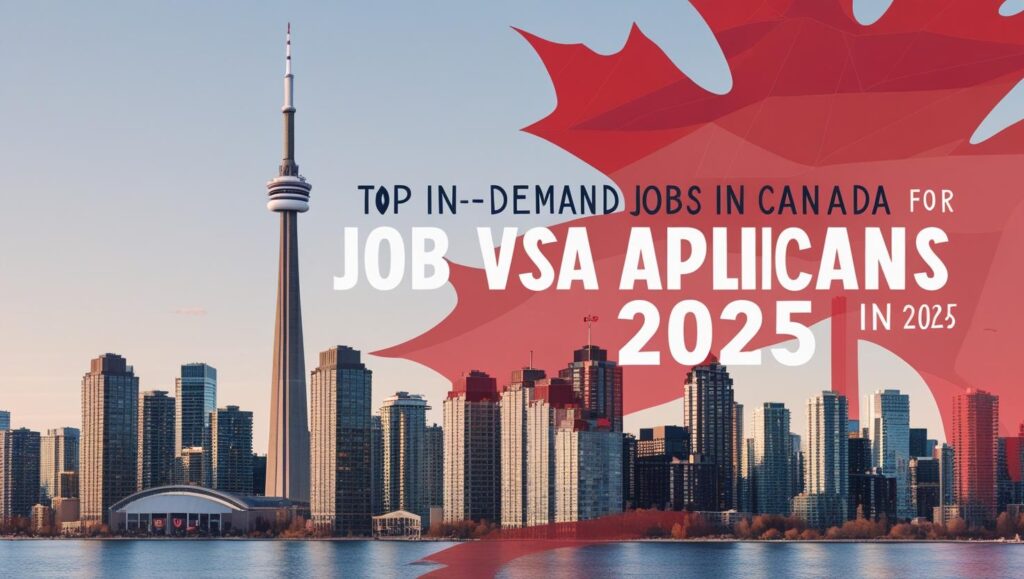Finding the best place to live and work in Canada isn’t just about picking a city with good jobs. It’s about finding a balance — affordable housing, career growth, safe communities, good schools, and a lifestyle that fits you.
If you’ve been searching endless Reddit threads or getting lost in government data, stop here. This guide breaks everything down simply — where to move, how much it costs, which cities are hiring, and what life’s really like in each region.
Here’s what you’ll get:
-
The top Canadian cities for jobs and quality of life
-
Average salaries and living costs
-
Pros and cons of each city
-
Practical tips for new immigrants
-
Mistakes to avoid before you move
Let’s make your move smarter — not harder.
Read Also: IRCC Processing Times in 2025 – Complete Guide to Canada Immigration Application Timelines
Why Choosing the Right City in Canada Matters
Canada is huge — from the mountains of British Columbia to the Atlantic coast. Each province has its own job market, culture, and cost of living. Picking the wrong city can mean struggling with rent or being stuck in a place with no job openings in your field.
Choosing wisely means:
-
Better career opportunities
-
Faster PR (Permanent Residency) through provincial programs
-
Affordable living while you settle
-
A higher chance of long-term success
Top 7 Best Places to Live and Work in Canada (2025)
1. Toronto, Ontario – The Economic Powerhouse
If you want big-city energy and opportunities in finance, tech, healthcare, or media — Toronto is the hub.
Average salary: $72,000/year
Average rent: $2,600/month for a one-bedroom
Top industries: Tech, banking, healthcare, education
Pros:
-
Largest job market in Canada
-
Diverse, multicultural population
-
Direct flights and connections everywhere
Cons:
-
Expensive housing
-
Heavy traffic and long commutes
Pro tip: If you work remotely or in digital fields, live in nearby cities like Mississauga, Brampton, or Hamilton — cheaper rent, same job access.
2. Vancouver, British Columbia – Work Where Mountains Meet the Ocean
Vancouver is for those who want great jobs and an unbeatable lifestyle. It’s big in film, tech, and tourism.
Average salary: $70,000/year
Average rent: $2,800/month
Top industries: Film, IT, construction, hospitality
Pros:
-
Mild weather year-round
-
Beautiful nature and active lifestyle
-
Strong immigrant community
Cons:
-
One of the most expensive cities in Canada
-
High competition for housing
Pro tip: Consider nearby cities like Surrey or Burnaby for cheaper housing and easy access to Vancouver’s job market.
3. Calgary, Alberta – High Salaries and Lower Taxes
Calgary is a smart pick if you want good pay and low living costs. The oil industry shaped its economy, but tech and renewable energy are now booming too.
Average salary: $78,000/year
Average rent: $1,800/month
Top industries: Energy, IT, engineering, construction
Pros:
-
No provincial sales tax (saves you money)
-
Strong economy and job stability
-
Affordable housing compared to Toronto or Vancouver
Cons:
-
Cold winters
-
Economy can fluctuate with oil prices
Pro tip: Calgary’s tech scene (especially AI and clean energy startups) is growing fast — perfect for skilled immigrants.
4. Ottawa, Ontario – The Capital with Balance
Ottawa blends government stability with tech jobs and family-friendly living. It’s cleaner, quieter, and more affordable than Toronto.
Average salary: $75,000/year
Average rent: $2,000/month
Top industries: Government, tech, education, healthcare
Pros:
-
Bilingual job opportunities (English & French)
-
High safety and education standards
-
Excellent for families
Cons:
-
Smaller entertainment scene
-
Colder than Toronto
Pro tip: If you’re a newcomer with French language skills, Ottawa’s public sector jobs are some of the most secure in Canada.
5. Montreal, Quebec – Culture, Creativity, and Lower Living Costs
Montreal offers a European-style lifestyle with affordable living and strong demand for bilingual professionals.
Average salary: $68,000/year
Average rent: $1,700/month
Top industries: Gaming, aerospace, AI, design
Pros:
-
Affordable rent
-
Rich culture, food, and arts
-
Growing tech and AI industries
Cons:
-
Most jobs require French
-
Bureaucracy can be slower for newcomers
Pro tip: Learning basic French opens up twice as many job options in Quebec.
6. Halifax, Nova Scotia – Growing Opportunities on the Coast
Halifax is one of Canada’s rising stars — affordable, friendly, and filled with new startups and government projects.
Average salary: $60,000/year
Average rent: $1,600/month
Top industries: Marine tech, education, public services, tourism
Pros:
-
Cheaper housing
-
Close-knit community feel
-
Expanding immigrant programs
Cons:
-
Smaller job market
-
Slower pace of life
Pro tip: Halifax is a hidden gem for international students and new immigrants who want PR without big-city costs.
7. Saskatoon, Saskatchewan – Affordable and Family-Friendly
If your goal is to settle easily, save money, and build a future, Saskatoon might surprise you.
Average salary: $65,000/year
Average rent: $1,300/month
Top industries: Agriculture, mining, healthcare, IT
Pros:
-
Very affordable housing
-
Easy to qualify for Saskatchewan PNP
-
Fast-growing economy
Cons:
-
Cold winters
-
Smaller city vibe
Pro tip: Great place for newcomers aiming for Permanent Residency under the Saskatchewan Immigrant Nominee Program (SINP).
Comparison Table: Best Cities for Work & Life in Canada (2025)
| City | Avg Salary (CAD) | Avg Rent (1BR) | Key Industries | Cost of Living | Immigration-Friendly |
|---|---|---|---|---|---|
| Toronto | $72,000 | $2,600 | Tech, Finance | High | Yes |
| Vancouver | $70,000 | $2,800 | IT, Film | Very High | Yes |
| Calgary | $78,000 | $1,800 | Energy, Tech | Moderate | Yes |
| Ottawa | $75,000 | $2,000 | Government, Tech | Moderate | Yes |
| Montreal | $68,000 | $1,700 | AI, Design | Low | Yes (French needed) |
| Halifax | $60,000 | $1,600 | Education, Marine | Low | Yes |
| Saskatoon | $65,000 | $1,300 | Agriculture, Health | Very Low | Yes |
Common Mistakes Newcomers Make When Choosing a City
-
Chasing “big name” cities only. Toronto and Vancouver are great, but your money goes further in Calgary or Halifax.
-
Ignoring job demand in your field. Always check which provinces are hiring for your specific occupation on Job Bank Canada.
-
Underestimating housing costs. Rent is the biggest expense. Check listings before you move.
-
Not learning French. For Quebec and parts of Ottawa, even basic French makes a big difference.
-
Skipping provincial nominee programs (PNPs). These programs can fast-track your PR if you live in the right province.
FAQs About Living and Working in Canada
1. What is the cheapest place to live in Canada with good jobs?
Saskatoon and Halifax offer some of the lowest housing costs while still having solid job markets and PR options.
2. Which city in Canada is best for new immigrants?
Ottawa and Calgary are top choices — friendly communities, affordable living, and many newcomer support programs.
3. Where can I get a work permit job easily in Canada?
Sectors like construction, hospitality, IT, and healthcare have high demand across multiple provinces. Use the official Canada Job Bank to search.
4. What’s the best province for PR in Canada?
Saskatchewan, Nova Scotia, and Alberta often have faster processing times through their PNP streams.
5. How much money do I need to settle in Canada?
Plan at least $15,000–$20,000 CAD for an individual or $25,000–$30,000 for a family of three to cover the first few months.
Final Thoughts: Where Should You Move?
Bottom line — there’s no single “best” place for everyone.
If you want big-city opportunities, go for Toronto or Vancouver.
If you prefer balance and stability, Ottawa or Calgary fits best.
If you want affordability and easy PR, start with Saskatoon or Halifax.
Canada offers incredible opportunities — you just need to match your goals with the right city.
Next step:
Check out the official Canada immigration page for program details — then read our next guide: “Top Jobs in Demand in Canada for Immigrants (2025 Edition)” to plan your move strategically.




Pingback: Tips for Immigrants: Settling in Canada Smoothly Canadian Life Hub
What a thoughtful and inspiring article — a great reminder of how many wonderful opportunities there are in Canada for people looking for a balance of a good lifestyle and meaningful work. It highlights that some cities offer not just jobs, but also a high quality of life, community, and stability — which many of us dream of. Thanks for putting together such a helpful guide for anyone considering making Canada their new home!